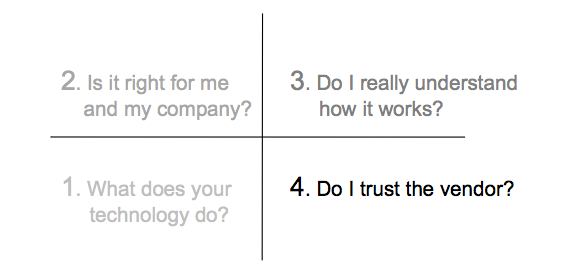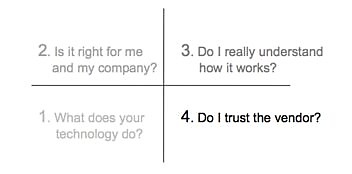The length of the sales cycle. The complexity of the buying process. The number of potential customers. The nature of the relationship with the end customer. The role and importance of merchandising and point of purchase. The place of brand.
In discussions about the difference between marketing in a B2C, as opposed to a B2B world, these points are all relevant. But anyone who has debated this issue not only needs to get out more, but also usually ends up at what is perceived to be a self evident truth: B2C marketing, it is said, is much more about building an emotional connection with the prospect than the supposedly much more ‘rational’ B2B environment.
On the face of it buying a new cloud-based CRM system to replace that old ragbag collection of sales support apps feels as if it should be a completely rational decision. You identify the need, draw up a shortlist, evaluate the proposals and then select a winning vendor (see Doug’s Four Steps to a B2B Sale here). What can be more rational than that?
But weirdly, emotion may play a much bigger role than most people think. A TED video by Simon Sinek argues persuasively that in the new world, people don’t buy what you do, they buy why you do it; and then justify their belief with all the rational stuff you give them. He bases his argument on the different roles of the neo-cortex and limbic systems in the brain. The latter controls human decision-making, but not language (which is where the neo-cortex comes in). Using examples like the Wright Brothers, Martin Luther King and Apple, his argument is that if you talk about what you believe rather than what you do, you’ll attract people who believe what you believe. If you’re involved in B2B marketing, it’s definitely worth spending the 18 minutes or so listening to Sinek’s argument.
I’m not an expert in brain chemistry, but this argument really rings true. And it’s supported by some research on what distinguishes high performance salespeople from their less well-performing colleagues undertaken a couple of years ago by Dr. Colin Coulson-Thomas under the banner of the Winning Companies; Winning People research programme. (This was brought to my attention by Don Fuller of Cotoco, a company that specialises in helping companies improve sales performance.)
Broadly speaking, Coulson-Thomas argues that the B2B sales process in most companies is as follows (see diagram below).

Most companies start by explaining what the service or product they offer actually is and then follow up with why it makes sense for the specific prospect in question, before moving on to explaining how it works. The hope is that over these three steps, the sales person will have built up enough trust to close the sale.
The Winning Companies; Winning People research, (based on research among 4000 companies) echoing Sinek, argues that the best sales performers actually start at the other end of the process. They start out looking to sell what their company stands for and believes in first. Then they use all the other rational stuff to support their case, or help their prospect make the case for the sale internally.
A recent blog by our good friend Jason Ball makes the same point, quoting Annette Simmons’ Whoever Tells the Best Story Wins:
“People don’t want information. They are up to their eyeballs in information. They want faith – faith in you, your goals, your success, in the story you tell.”
The implication for B2B marketing is pretty clear: you can stand out from the crowd and sell more effectively if you concentrate on marketing that tells the world what you believe in. By doing that in the right way, you can get prospects really excited and enlist them to your cause. You’ll attract people who believe what you believe and they’ll help you attract others like them.
It works for Apple, so why not you?

Enjoyed this article?
Take part in the discussion








Comments
Francis Moran May 10th, 2011
When the concept of B2B marketing was first defined, it was widely held that it ought to be a far more rational process than trying to sell to those messed-up emotional consumers. Turned out, we were still selling to people, not companies, and so all the old emotional principles — and “old” is exactly the right term here since what we are talking about is hard-wired into our ancient reptilian brains — still applied.
The rising understanding about buyer behaviour that neuroscience is giving is so critical to the B2B marketing process that we recruited a leading neuro-marketer to be a regular contributor on our new blog, which is all about bringing technology to market. You can read his regular contributions here: http://www.francis-moran.com.
Jason Ball May 10th, 2011
Yes, the myth of rationality. We all think we’re perfectly rational creatures but few of us actually are. In reality some 95% of our thinking happens in the unconscious brain (whether we’re deciding on a mate or making a complex B2B purchase).
Of course, we’re brilliant at post-rationalising. As Gerald Zaltman, author of the excellent How Customers Think and source of the above stat, points out:
“Rather than actually guiding or controlling behaviour. Consciousness seems mainly to make sense of behaviour after it is executed.”
Yet all too often in B2B marketing, emotion is parked at the door and value is left on the table.
Stan Woods May 11th, 2011
Jay & Francis
Thanks for commenting.
It is frustrating when good ideas are killed by clients who don’t want to stand out from the crowd and expose what’s special about their company.
Francis, smart move on hiring the brain surgeon. Had a look at your site. Perhaps we should chat sometime?
Andrew Armour May 13th, 2011
Interesting article. Whilst it is natural for sales and marketing personnel to focus on mechanics, delivery and ‘big picture’ it is often simple issues of trust and a willingness to collaborate that build a foundation of a decent relationship. As a related point, I have just written a two part blog on the role of trust in marketing partnerships and alliances, looking at the both the biology thatprevents trust and the tactics relationship managers can use to try to build it. If you’d like to see more see the blogs on http://www.andrewarmour.com and some broader articles on collaborative marketing at http://www.benchstone.uk
Stan Woods May 13th, 2011
Andrew
Thanks a lot for introducing us to your blog. I’ll look forward to getting feedback from Doug after you two have met.
Keith Smiley May 18th, 2011
It’s also important that your marketing pieces focus on the challenges, needs, and interests of the prospects that you’re targeting. It’s not enough to just describe the benefits and features of the product and service.